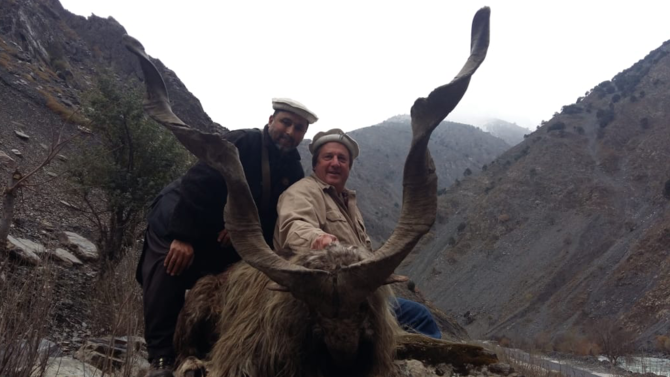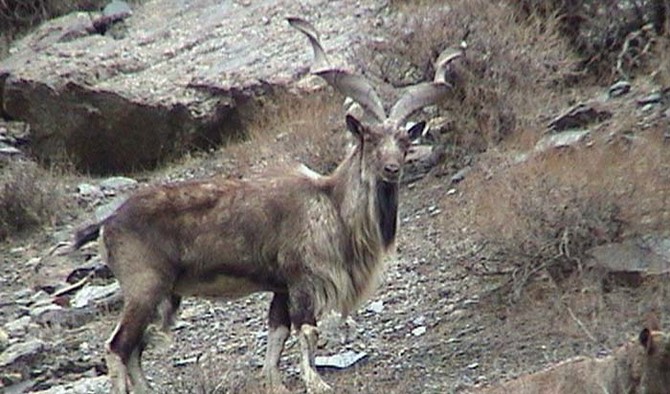PESHAWAR: Commending the government’s move to protect Pakistan’s national animal, the Markhor, conservationists said that the initiative has finally paid off, resulting in a considerable increase in the endangered species’ population.
Markhor (or screw-horn goat) hunting is a legalized sport in Pakistan’s northwestern Khyber Pakhtunkhwa (KP) province. However, by making it expensive to procure a hunting license, authorities have been successful in ensuring that the number of Markhors has risen to more than 4,000 in the last three decades.
“Markhor numbers have jumped from few hundreds to more than 4,000 in last three decades,” Safdar Shah, the chief conservator of KP’s wildlife department, told Arab News.
He added that strict surveillance on part of the Village Conservation Community (VCC) and a ban on hunting without official permits have been the main reasons for an increase in the population of the species.
“The locals are now protecting it, as 80 percent of trophy hunting’s revenue goes to the local community,” Shah said.
Shah added that the provincial government, along with local community members, have taken up the responsibility of owning and protecting the animal from illegal hunters.
The Markhor inhabits the northern areas of Chitral, Hunza, and a few other mountainous regions where it lives at an altitude of 3,500 to 12,000 feet above sea level.
Trophy hunting of the animal, which began in 1998-99, has seen officials issue 69 licenses till date and amass a revenue of $4.3 million in the process, wildlife department officials told Arab News.
Markhor trophy hunting, conservation efforts go side by side
Markhor trophy hunting, conservation efforts go side by side

- Endangered species’ population has gone up from a few hundred to more than 4,000
- The rate for each hunting license varies from $80,000 to $120,000
Hundreds of migrants, including Pakistanis, land in Greece after search operation at sea

- Rescued migrants were taken to a temporary facility on Crete after reaching the port of Agia Galini
- Greece has made deportations of rejected asylum seekers a priority under its migration policy
ATHENS: Greece’s Coast Guard rescued about 540 migrants from a fishing boat off Europe’s southernmost island of Gavdos on Friday, one of the biggest groups to reach the country in recent months.
The migrants were found during a Greek search operation some 16 nautical miles (29.6 km) off Gavdos, a Coast Guard statement said. They are all well and are being taken to a temporary facility on the nearby island of Crete after reaching the port of Agia Galini, a Coast Guard official said, adding most of the migrants were men from Bangladesh, Egypt and Pakistan.
In a separate incident on Thursday, the EU’s border agency Frontex rescued 65 men and five women from two migrant boats in distress off Gavdos, the Greek Coast Guard said.
Greece was on the front line of a 2015-16 migration crisis when more than a million people from the Middle East and Africa landed on its shores before moving on to other European countries, mainly Germany.
Flows have ebbed since then, but both Crete and Gavdos — the two Mediterranean islands nearest to the African coast — have seen a steep rise in migrant boats, mainly from Libya, reaching their shores over the past year and deadly accidents remain common along that route.
Greece, Cyprus, Spain and Italy will be eligible for help in dealing with migratory pressures under a new EU mechanism when the bloc’s pact on migration and asylum enters into force in mid-2026.
The center-right government of Prime Minister Kyriakos Mitsotakis has said deportation of rejected asylum seekers will be a priority.










